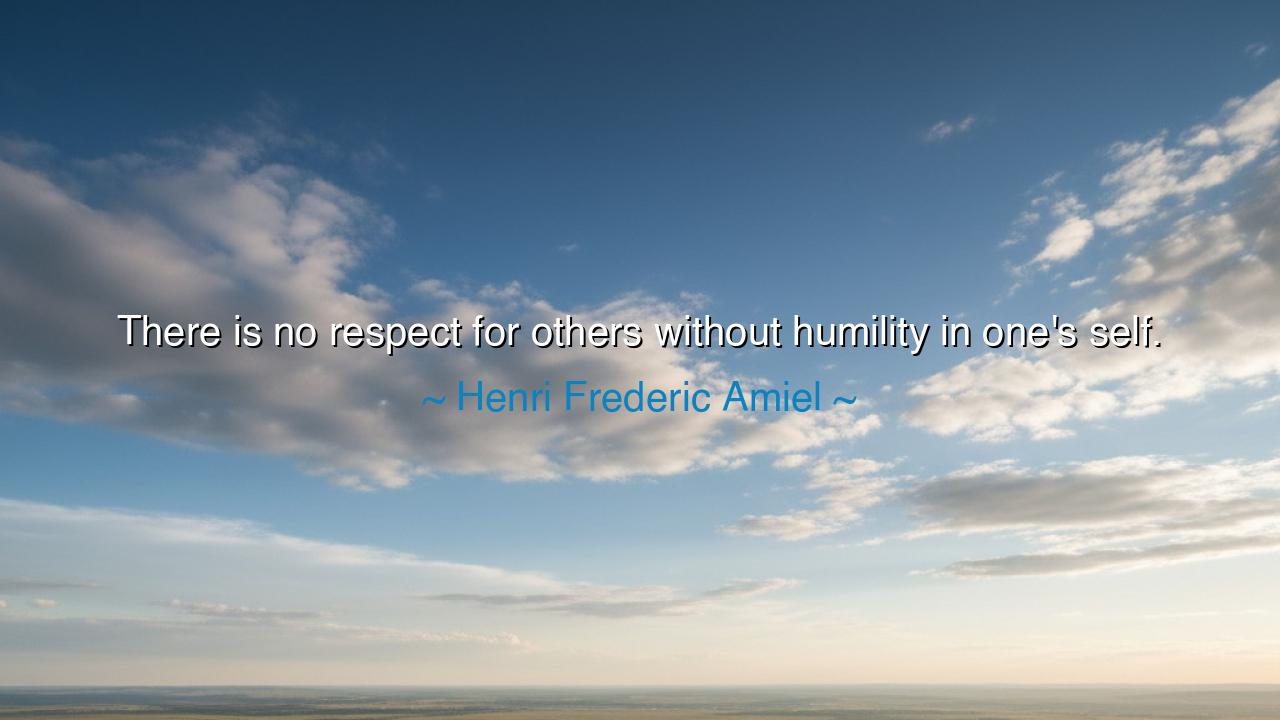
There is no respect for others without humility in one's self.






The words of Henri Frederic Amiel, “There is no respect for others without humility in one’s self,” flow with the quiet authority of a timeless truth. They remind us that the way we treat others is born first from the state of our own hearts. Without humility, respect becomes shallow, a mask of politeness rather than a genuine recognition of dignity. But when humility lives within us, it allows us to see beyond pride, beyond prejudice, and to honor the humanity of those around us. Respect is not truly given unless it flows from the soil of humility.
To be humble is not to think less of oneself, but to see clearly that we are not greater than others. Humility strips away arrogance and makes room for reverence. It teaches us that every person, regardless of their station, bears the same sacred spark of existence. Amiel’s words remind us that those who carry themselves with pride alone will never see the worth of another, for their vision is clouded by their own self-importance. But those who are humble bow inwardly before truth, and in that bowing, they find the strength to lift others up.
The ancients spoke often of this. In the wisdom of the Greeks, hubris—overbearing pride—was always punished by the gods. In the teachings of Christ, it is written, “Whoever exalts himself shall be humbled, and whoever humbles himself shall be exalted.” And in the East, the sage Lao Tzu taught that the greatest rivers and oceans become mighty precisely because they place themselves lower than the streams that flow into them. Humility has always been the doorway to respect, and through respect, to harmony among men.
History bears witness to this truth. Consider Abraham Lincoln, who, though president, often spoke with gentleness and deference to ordinary citizens. He carried not the arrogance of power, but the humility of a servant. This humility allowed him to respect even those who reviled him, to treat opponents with dignity, and to seek reconciliation rather than vengeance after the Civil War. His greatness was not simply in leadership, but in the deep humility that enabled him to see the humanity of others. Without it, he could not have inspired the respect of both allies and enemies.
By contrast, we see in tyrants the ruin that comes when humility is absent. Kings and rulers who exalt themselves above all others grow blind to the dignity of their people. They demand respect yet cannot offer it, for their pride consumes every shred of humility within them. Such respect, born of fear, is hollow and fleeting. When their power crumbles, so too does the false reverence they demanded. Respect that is not rooted in humility cannot last, for it is not true respect at all, but submission to fear.
The heart of Amiel’s teaching is this: respect is not a performance—it is the natural outpouring of a humble soul. To cultivate humility is to prepare the soil of the heart from which genuine respect can grow. Without humility, one may command obedience, but never honor. With humility, even the simplest word or gesture toward another carries the power to heal, to uplift, and to build bridges of trust.
The lesson for us is clear: if you wish to respect others, begin first by cultivating humility within yourself. Recognize your own flaws and limitations; remember that wisdom and strength are not yours alone, but are found in all people. Speak with gentleness even when you have power; listen with openness even when you believe yourself right. Humility is the key that unlocks respect, and respect is the bond that sustains human fellowship.
Practical actions follow. Practice gratitude daily, for it humbles the heart and opens the eyes to the gifts of others. When tempted to judge, pause and ask what struggles you cannot see in the life of another. When holding power—whether over one or many—choose to serve rather than dominate. And in all things, remind yourself that every soul you meet is equal in dignity to your own.
Thus, Amiel’s words endure as an eternal law: “There is no respect for others without humility in one’s self.” Let them guide your heart, so that respect flows not as an empty courtesy, but as the living fruit of a humble soul. For in humility lies the beginning of wisdom, and in respect, the path to peace.






AAdministratorAdministrator
Welcome, honored guests. Please leave a comment, we will respond soon